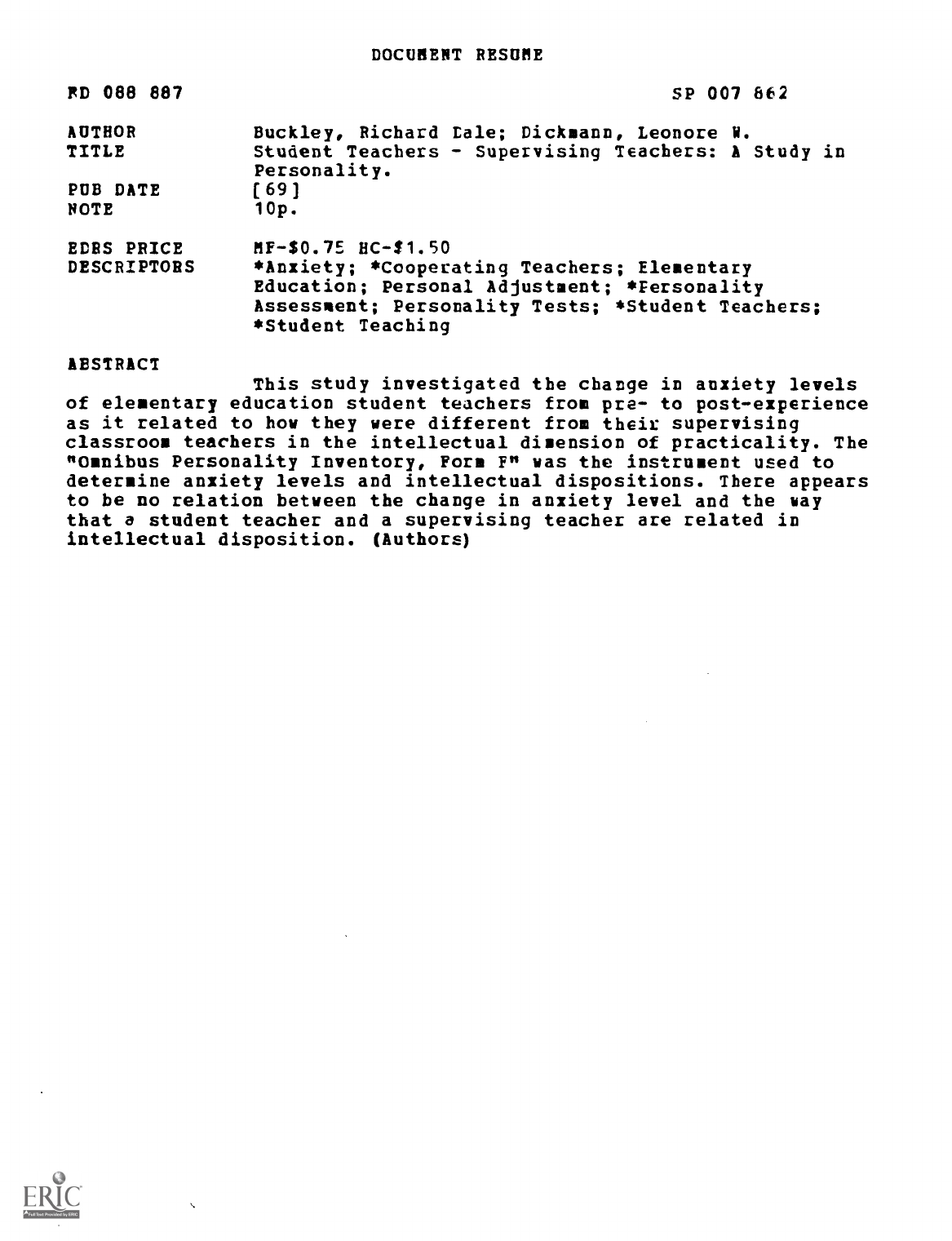
DOCUMENT RESUME
ND 088 887
SP 007 662
AUTHOR
Buckley, Richard tale; Dickmann, Leonore W.
TITLE
Student Teachers - Supervising Teachers: A Study in
Personality.
PUB DATE [69]
NOTE
10p.
EDRS PRICE
DESCRIPTORS
MF-$0.7.5 HC-$1.50
*Anxiety; *Cooperating Teachers; Elementary
Education; Personal Adjustment; *Personality
Assessment; Personality Tests; *Student Teachers;
*Student Teaching
ABSTRACT
This study investigated the change in anxiety levels
of elementary education student teachers from pre- to post-experience
as it related to how they were different from their supervising
classroom teachers in the intellectual dimension of practicality. The
"Omnibus Personality Inventory, Form F" was the instrument used to
determine anxiety levels and intellectual dispositions. There appears
to be no relation between the change in anxiety level and the way
that a student teacher and a supervising teacher are related in
intellectual disposition. (Authors)
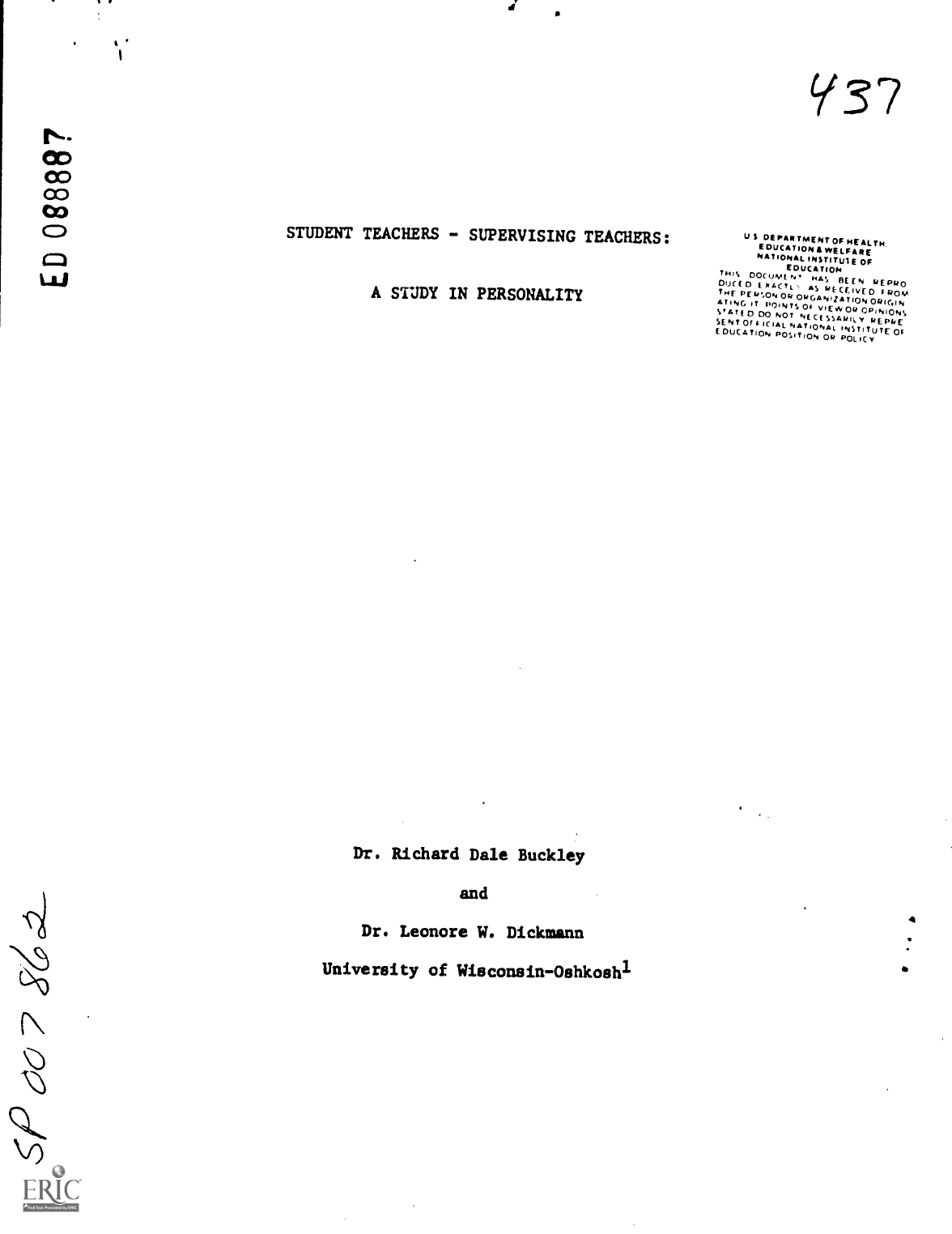
STUDENT TEACHERS - SUPERVISING TEACHERS:
A STUDY IN PERSONALITY
Dr. Richard Dale Buckley
and
Dr. Leonora W. Dickmann
University of Wisconsin-Oshkoshl
bc)
V37
U S DEPARTMENT OC
WEALTH.
EDUCATION 1 WELFARE
NATIONAL INSTITUTE
OF
EDUCATION
THIS DOCoMt N
HAS BEEN PCPPO
DUCE() I AACTL, AS
1,ECElvt0 FROM
1.1 PE PSON OW
OPGANZATIONORi(SIN
AT.NG IT POINTS OI
vE NOW OPINIONS
SAli 0 DO NOT NICE
SSAIttLY PEPPE
SENT OT I iCiAL
NATIONAL INSTITUTE
OF
EDUCATION POSITION
OW POLIcv
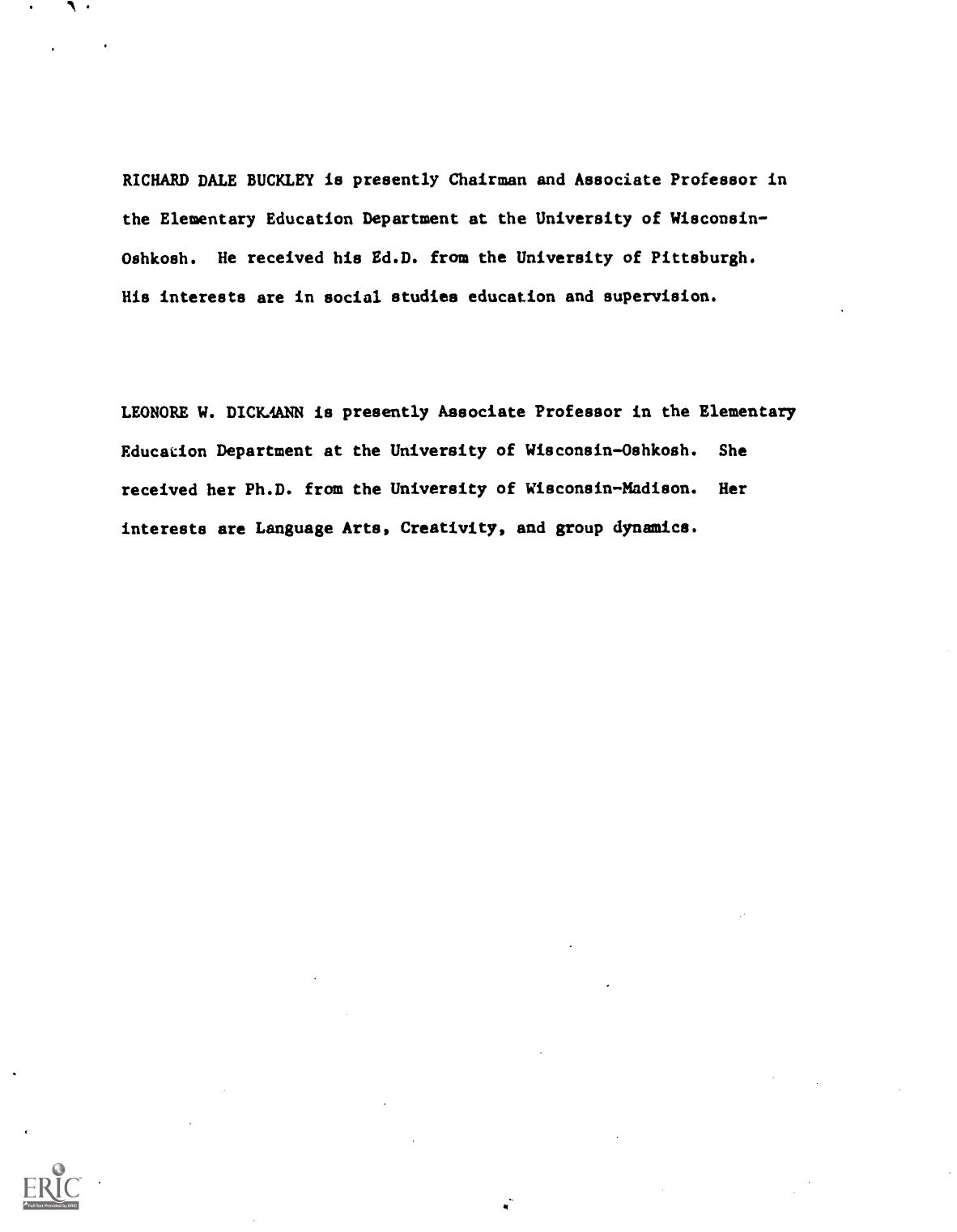
RICHARD DALE BUCKLEY is presently Chairman and Associate Professor in
the Elementary Education Department at the University of Wisconsin-
Oshkosh.
He received his Ed.D. from the University of Pittsburgh.
His interests are in social studies education and supervision.
LEONORE W. DICKAANN is presently Associate Professor in the Elementary
Education Department at the University of Wisconsin-Oshkosh.
She
received her Ph.D. from the University of Wisconsin-Madison.
Her
interests are Language Arts, Creativity, and group dynamics.
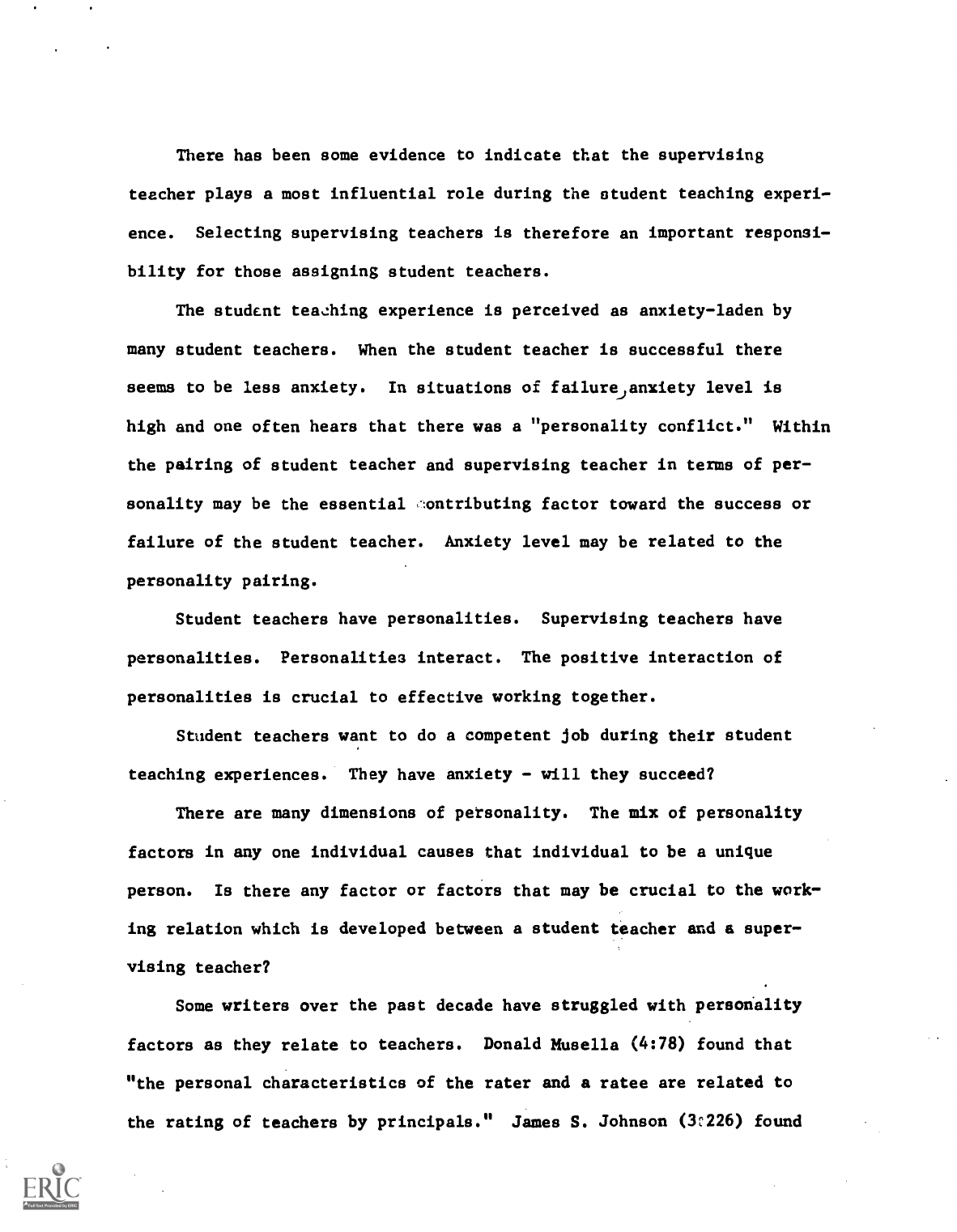
There has been some evidence to indicate that the supervising
teacher plays a most influential role during the otudent teaching experi-
ence.
Selecting supervising teachers is therefore an important responsi-
bility for those assigning student teachers.
The student teaching experience is perceived as anxiety-laden by
many student teachers.
When the student teacher is successful there
seems to be less anxiety. In situations of failurejanxiety level is
high and one often hears that there was a "personality conflict." Within
the pairing of student teacher and supervising teacher in terms of per-
sonality may be the essential ontributing factor toward the success or
failure of the student teacher. Anxiety level may be related to the
personality pairing.
Student teachers have personalities.
Supervising teachers have
personalities.
Personalitie3 interact. The positive interaction of
personalities is crucial to effective working together.
Student teachers want to do a competent job during their student
teaching experiences.
They have anxiety - will they succeed?
There are many dimensions of personality.
The mix of personality
factors in any one individual causes that individual to be a unique
person.
Is there any factor or factors that may be crucial to the work-
ing relation which is developed between a student teacher and a super-
vising teacher?
Some writers over the past decade have struggled with personality
factors as they relate to teachers.
Donald Musella (4:78) found that
"the personal characteristics of the rater and a ratee are related to
the rating of teachers by principals."
James S. Johnson (3226) found
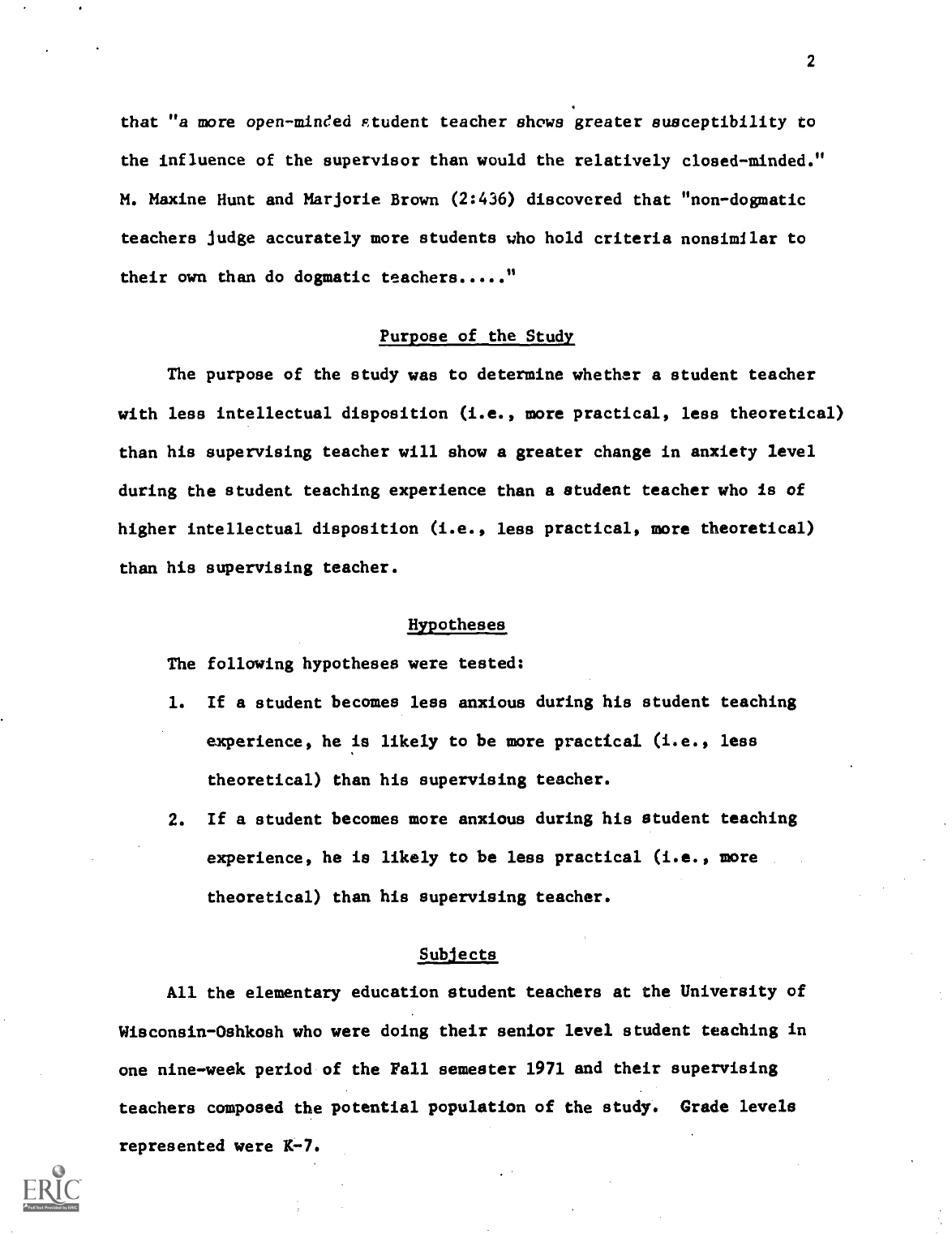
2
that "a more open - minced student teacher shows greater susceptibility to
the influence of the supervisor than would the relatively closed-minded."
M. Maxine Hunt and Marjorie Brown (2:436) discovered that "non-dogmatic
teachers judge accurately more students who hold criteria nonsimilar to
their own than do dogmatic teachers
11
Purpose of the Study
The purpose of the study was to determine whether a student teacher
with less intellectual disposition (i.e., more practical, less theoretical)
than his supervising teacher will show a greater change in anxiety level
during the student teaching experience than a student teacher who is of
higher intellectual disposition (i.e., less practical, more theoretical)
than his supervising teacher.
Hypotheses
The following hypotheses were tested:
1.
If a student becomes less anxious during his student teaching
experience, he is likely to be more practical (i.e., less
theoretical) than his supervising teacher.
2.
If a student becomes more anxious during his student teaching
experience, he is likely to be less practical (i.e., more
theoretical) than his supervising teacher.
Sub ects
All the elementary education student teachers at the University of
Wisconsin-Oshkosh who were doing their senior level student teaching in
one nine-week period of the Fall semester 1971 and their supervising
teachers composed the potential population of the study.
Grade levels
represented were K-7.
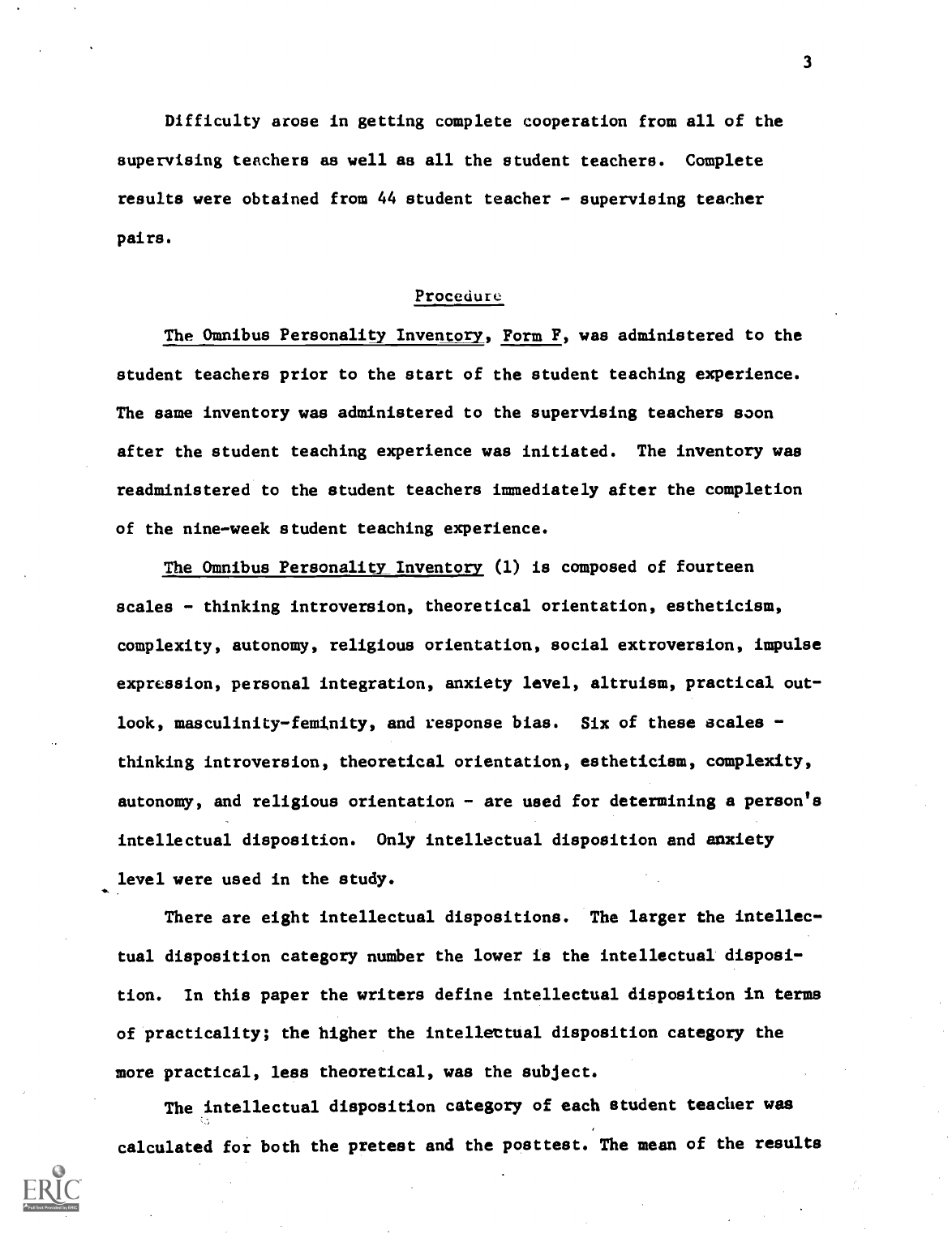
3
Difficulty arose in getting complete cooperation from all of the
supervising teachers as well as all the student teachers. Complete
results were obtained from 44 student teacher - supervising teacher
pairs.
Procedure
The Omnibus Personality Inventory, Form F, was administered to the
student teachers prior to the start of the student teaching experience.
The same inventory was administered to the supervising teachers soon
after the student teaching experience was initiated. The inventory was
readministered to the student teachers immediately after the completion
of the nine-week student teaching experience.
The Omnibus Personality Inventory (1) is composed of fourteen
scales - thinking introversion, theoretical orientation, estheticism,
complexity, autonomy, religious orientation, social extroversion, impulse
expression, personal integration, anxiety level, altruism, practical out-
look, masculinity-feminity, and response bias.
Six of these scales -
thinking introversion, theoretical orientation, estheticism, complexity,
autonomy, and religious orientation - are used for determining a person's
intellectual disposition.
Only intellectual disposition and anxiety
level were used in the study.
There are eight intellectual dispositions.
The larger the intellec-
tual disposition category number the lower is the intellectual disposi-
tion.
In this paper the writers define intellectual disposition in terms
of practicality; the higher the intellettual disposition category the
more practical, less theoretical, was the subject.
The intellectual disposition category of each student teacher was
calculated for both the pretest and the posttest. The mean of the results
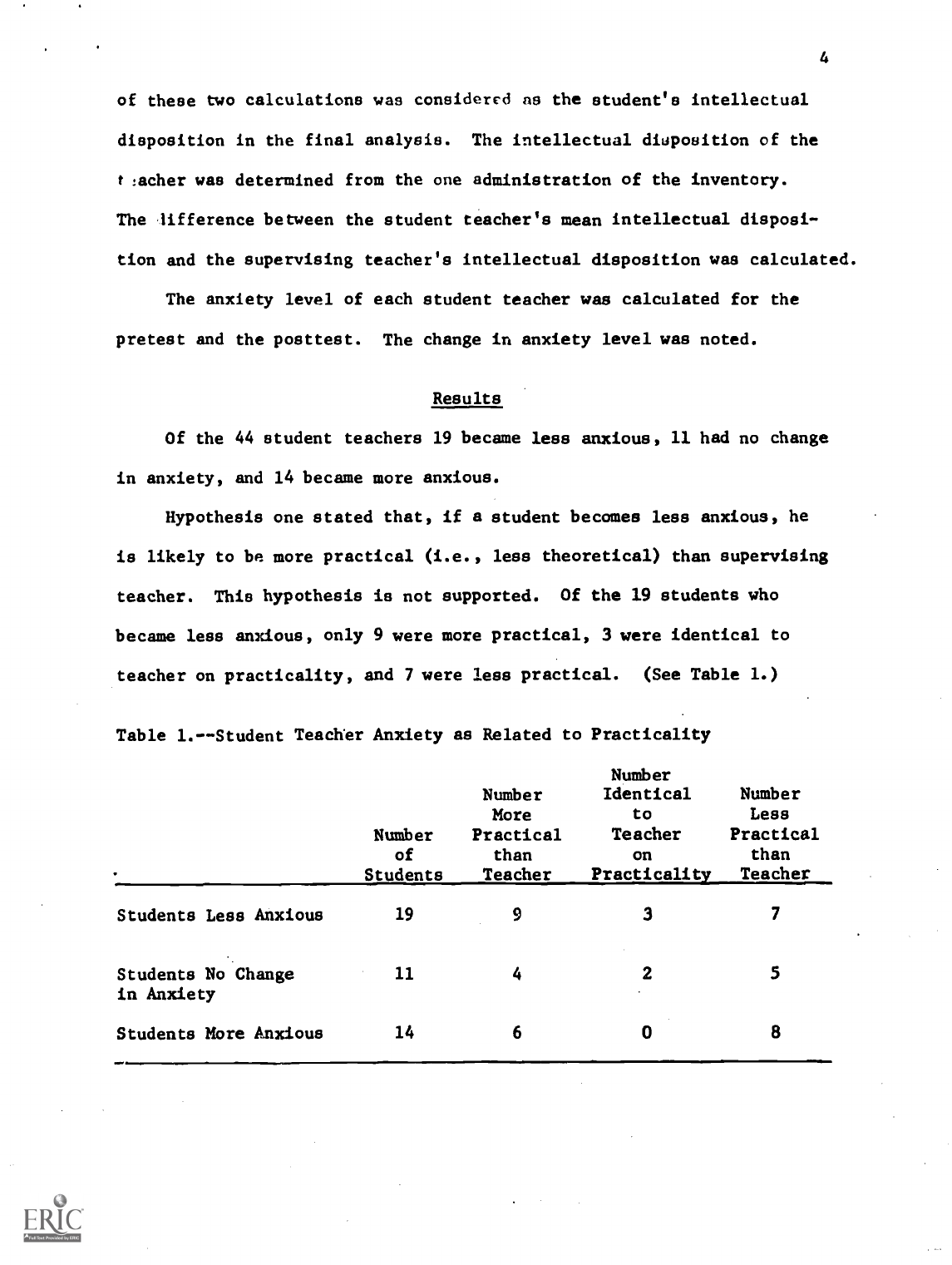
4
of these two calculations was considered as the student's intellectual
disposition in the final analysis.
The intellectual disposition of the
teacher was determined from the one administration of the inventory.
The lifference between the student teacher's mean intellectual disposi-
tion and the supervising teacher's intellectual disposition was calculated.
The anxiety level of each student teacher was calculated for the
pretest and the posttest. The change in anxiety level was noted.
Results
Of the 44 student teachers 19 became less anxious, 11 had no change
in anxiety, and 14 became more anxious.
Hypothesis one stated that, if a student becomes less anxious, he
is likely to be more practical (i.e., less theoretical) than supervising
teacher.
This hypothesis is not supported.
Of the 19 students who
became less anxious, only 9 were more practical, 3 were identical to
teacher on practicality, and 7 were less practical.
(See Table 1.)
Table 1.--Student Teacher Anxiety as Related to Practicality
Number
Number
Identical
Number
More
to Less
Number
Practical
Teacher Practical
of than
on
than
Students
Teacher Practicality
Teacher
Students Less Anxious
19
9
3
7
Students No Change
in Anxiety
11 4
2 5
Students More Anxious
14 6
8
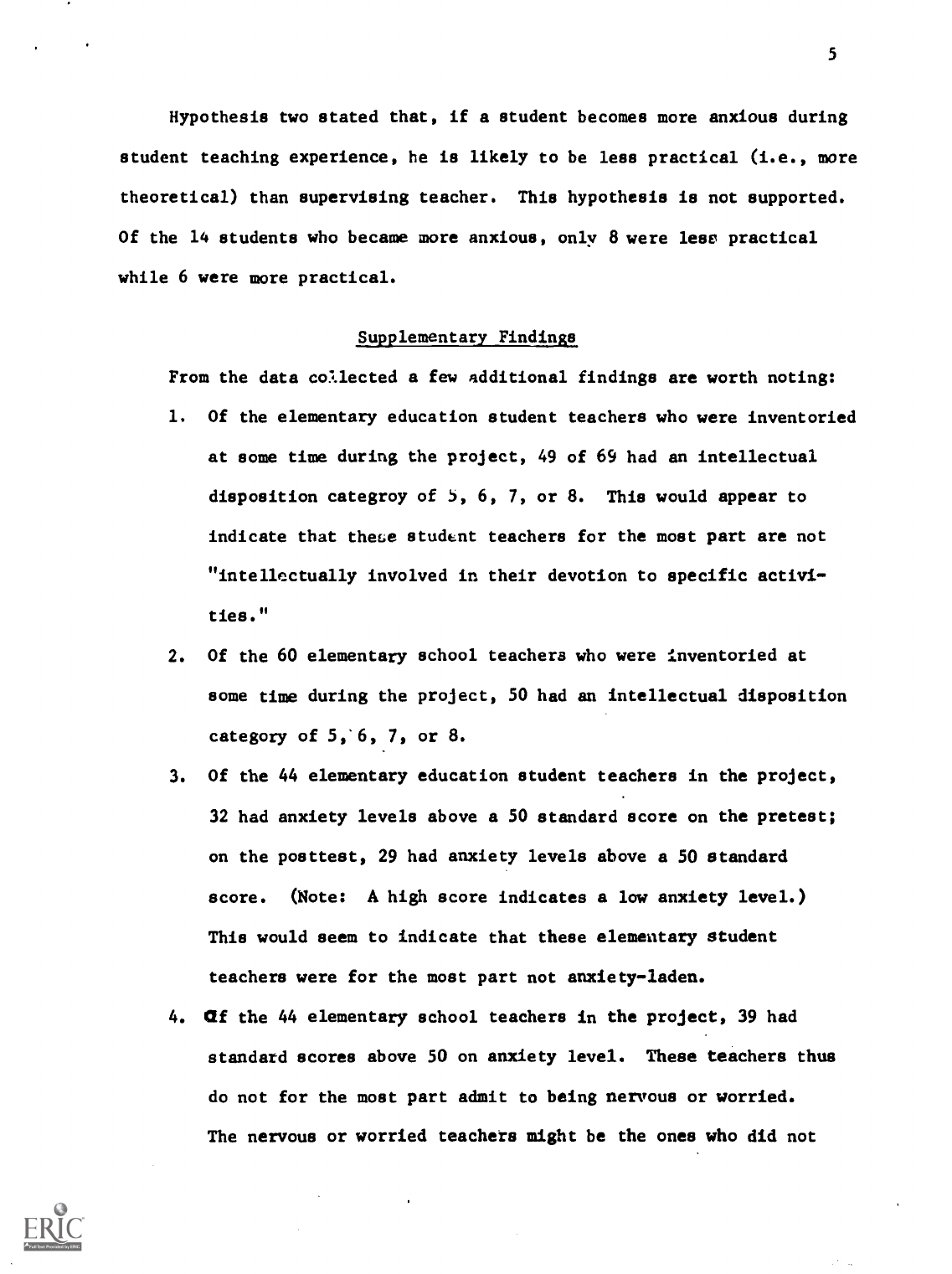
5
Hypothesis two stated that, if a student becomes more anxious during
student teaching experience, he is likely to be less practical (i.e., more
theoretical) than supervising teacher.
This hypothesis is not supported.
Of the 14 students who became more anxious, only 8 were leas practical
while 6 were more practical.
Supplementary Findings
From the data collected a few additional findings are worth noting:
1.
Of the elementary education student teachers who were inventoried
at some time during the project, 49 of 69 had an intellectual
disposition categroy of S, 6, 7, or 8. This would appear to
indicate that these student teachers for the most part are not
"intellectually involved in their devotion to specific activi-
ties."
2.
Of the 60 elementary school teachers who were inventoried at
some time during the project, 50 had an intellectual disposition
category of 5,'6, 7, or 8.
3.
Of the 44 elementary education student teachers in the project,
32 had anxiety levels above a 50 standard score on the pretest;
on the posttest, 29 had anxiety levels above a 50 standard
score. (Note: A high score indicates a low anxiety level.)
This would seem to indicate that these elementary student
teachers were for the most part not anxiety-laden.
4.
Of the 44 elementary school teachers in the project, 39 had
standard scores above 50 on anxiety level.
These teachers thus
do not for the most part admit to being nervous or worried.
The nervous or worried teachers might be the ones who did not
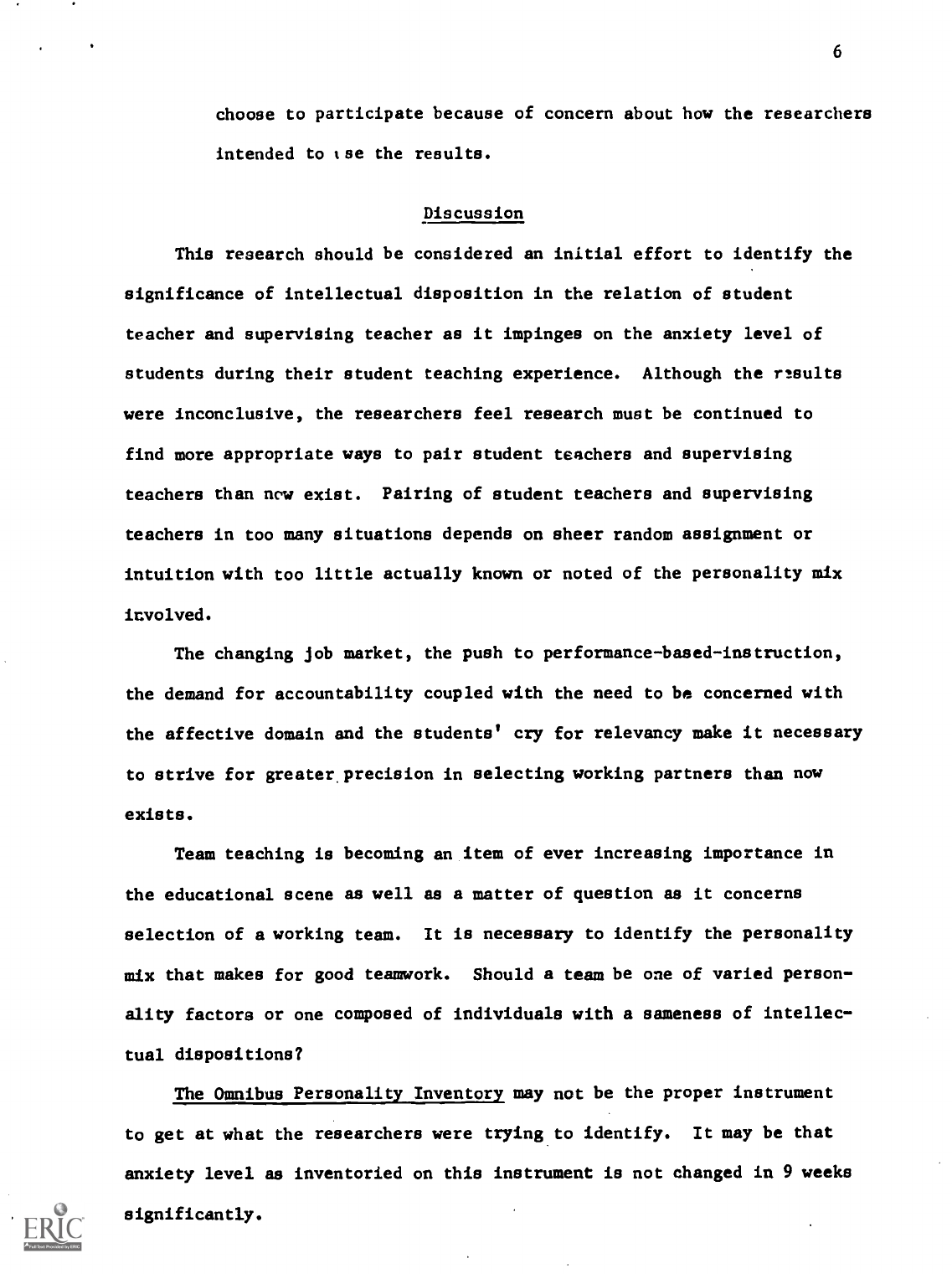
6
choose to participate because of concern about how the researchers
intended to Ise the results.
Discussion
This research should be considered an initial effort to identify the
significance of intellectual disposition in the relation of student
teacher and supervising teacher as it impinges on the anxiety level of
students during their student teaching experience. Although the r2sults
were inconclusive, the researchers feel research must be continued to
find more appropriate ways to pair student teachers and supervising
teachers than new exist.
Pairing of student teachers and supervising
teachers in too many situations depends on sheer random assignment or
intuition with too little actually known or noted of the personality mix
involved.
The changing job market, the push to performance-based-instruction,
the demand for accountability coupled with the need to be concerned with
the affective domain and the students' cry for relevancy make it necessary
to strive for greater, precision in selecting working partners than now
exists.
Team teaching is becoming an item of ever increasing importance in
the educational scene as well as a matter of question as it concerns
selection of a working team.
It is necessary to identify the personality
mix that makes for good teamwork.
Should a team be one of varied person-
ality factors or one composed of individuals with a sameness of intellec-
tual dispositions?
The Omnibus Personality Inventory may not be the proper instrument
to get at what the researchers were trying to identify.
It may be that
anxiety level as inventoried on this instrument is not changed in 9 weeks
significantly.
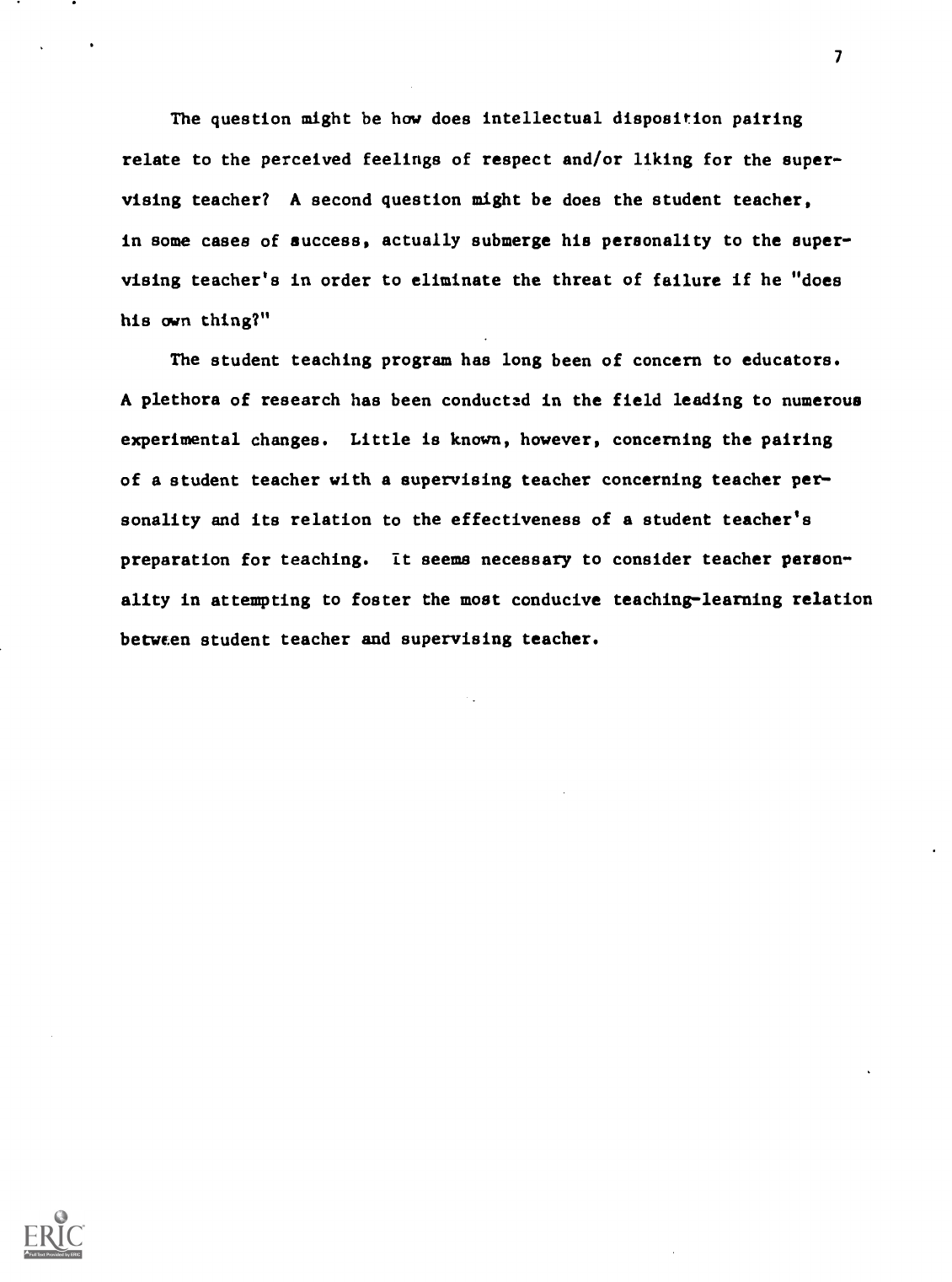
7
The question might be how does intellectual disposition pairing
relate to the perceived feelings of respect and/or liking for the super-
vising teacher? A second question might be does the student teacher,
in some cases of success, actually submerge his personality to the super-
vising teacher's in order to eliminate the threat of failure if he "does
his awn thing?"
The student teaching program has long been of concern to educators.
A plethora of research has been conducted in the field leading to numerous
experimental changes. Little is known, however, concerning the pairing
of a student teacher with a supervising teacher concerning teacher per-
sonality and its relation to the effectiveness of a student teacher's
preparation for teaching.
It seems necessary to consider teacher person-
ality in attempting to foster the moat conducive teaching-learning relation
between student teacher and supervising teacher.
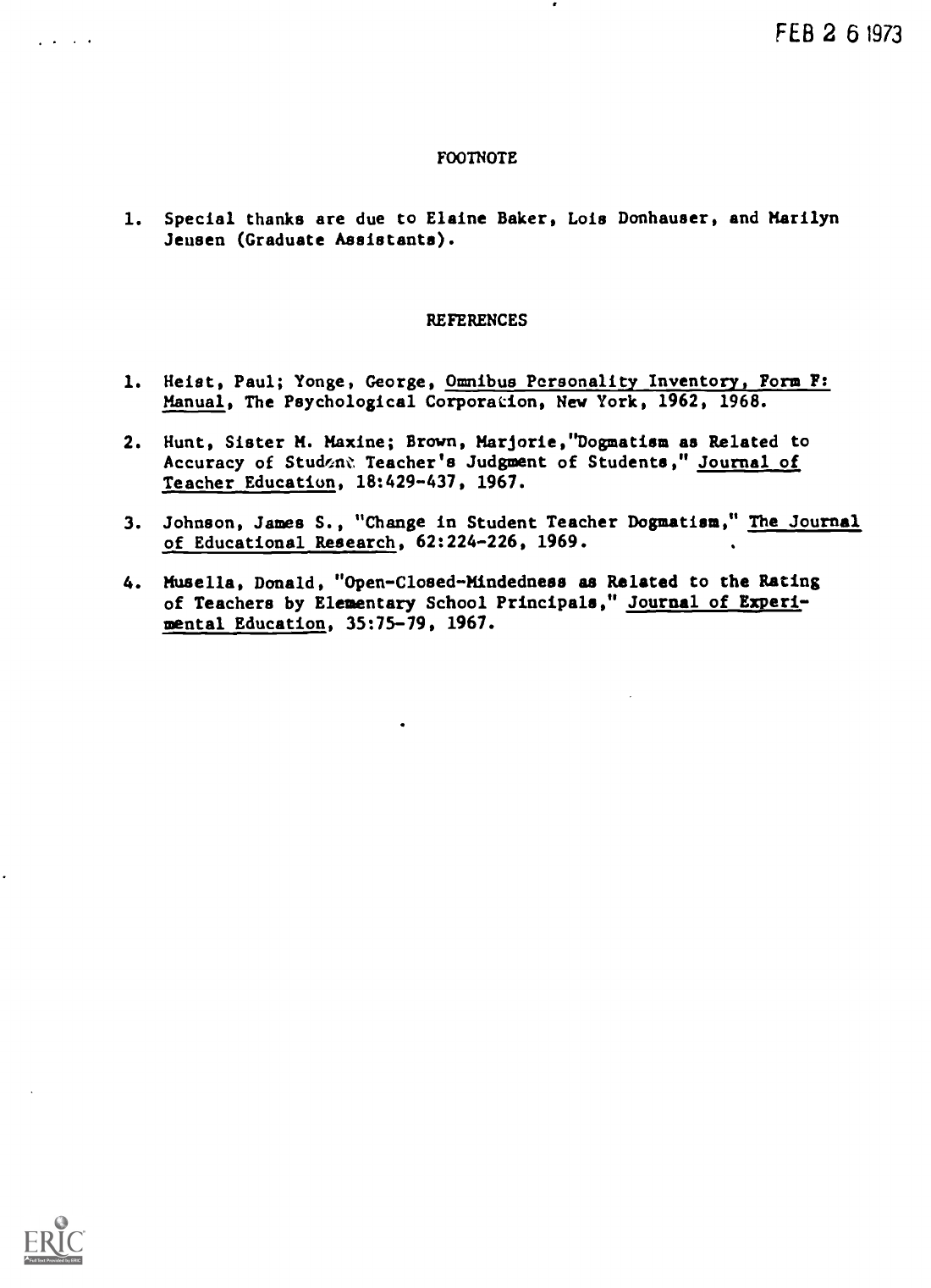
FEB 2 6 1973
FOOTNOTE
1.
Special thanks are due to Elaine Baker, Lois Donhauser, and Marilyn
Jensen (Graduate Assistants).
REFERENCES
1.
Heist, Paul; Yonge, George, Omnibus Personality Inventory, Form F:
Manual, The Psychological Corporation, New York, 1962, 1968.
2.
Hunt, Sister M. Maxine; Brown, Marjorie,"Dogmatism as Related to
Accuracy of StudrinZ Teacher's Judgment of Students," Journal of
Teacher Education, 18:429-437, 1967.
3.
Johnson, James S., "Change in Student Teacher Dogmatism," The Journal
of Educational Research, 62:224-226, 1969.
4.
Musella, Donald, "Open-Closed-Mindedness as Related to the Rating
of Teachers by Elementary School Principals," Journal of Experi-
mental Education, 35:75-79, 1967.
